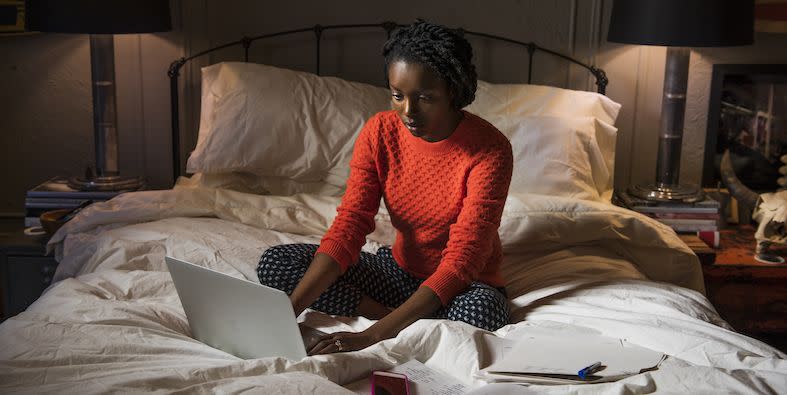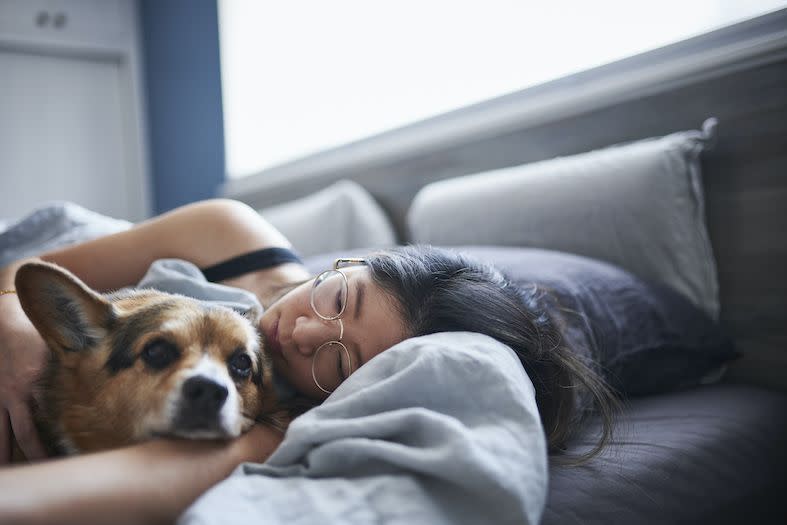Is sleep before midnight actually 'worth more' and better for the body?

Have you ever heard someone (quite possibly your mum... after spotting you yawning for the tenth time at dinner) say that sleep before midnight is worth more – or is more 'valuable' – than the sleep that comes after? So, essentially, getting an early night is key to feeling refreshed and restored? Us too, but as with anything, we're always keen to hear it from a bona fide expert before fully buying into it (sorry, mum).
With that in mind, intent on finding out if sleep before midnight actually is somehow more magical in comparison to all the hours of snoozing that come post 12am, we had a chat with Dave Gibson, an expert at eve Sleep (you know, the ones who make the famous hybrid mattresses) and founder of The Sleep Site.
Sleep research has come a long way, he begins, saying, "It’s now known that if we sleep in line with our individual body clock (or 'circadian rhythm'), that we get the best sleep possible – both in terms of quality and quantity. For most adults this means an optimum window of falling asleep between 10pm and 12pm midnight."
Gibson that notes that recent research supervised by Exeter University showed that those who fell asleep between 10pm and 10:59pm also had a lower risk of cardiovascular disease than those who dozed off earlier or later.
"Those who went to bed after midnight had a 25% increased risk of cardiovascular disease," he explains. "The reason being is that when we sleep out of line with our body clock we experience increased inflammation, problems with glucose regulation and insulin resistance, all of which contribute to and are risks for cardiovascular disease."

"Our body and brain tend to repair better too before midnight, so much so that those some studies (one of which examined 400,000 people over the space of 6.5 years) have even suggested those who get to bed before midnight tend to live longer than those who don’t."
However, if you're now pranging out about the fact you regularly go to bed at 1am (same), fear not – we're not all designed to fall asleep before midnight. "One of the researchers' conclusions was that this may be due to psychological and physiological risk factors related to poor health, such as smoking and alcohol intake, irregular eating habits and lower physical activity, previously been associated with evening-types." And thankfully, those lifestyle choices are something we have control over.
"Research has shown that somewhere between 20% to 30% of adults have a Night Owl Chronotype and they typically get an extra burst of energy at night," notes Gibson. "This may be a hangover from prehistoric times, wherein some of the tribe would need to stay awake and watch for danger as the others slept."
It's also thought that teenagers are more likely to naturally favour a post-midnight bedtime too, as the teenage body clock undergoes a circadian shift to create a 'Super Night Owl' sleep pattern and melatonin, the hormone which generates our desire to sleep, is secreted approximately two hours later than adults or children.
"This is why teenagers struggle to get to sleep before midnight, it’s thought that this enables a mini tribe to be created which enable social development with teenage peers away from the adults," adds Gibson.
Keen to find out whether you're in the 20% of the population who just can't enough of a late night? "One way of trying to work out your Chronotype naturally, would be to go to bed when you feel tired and allow yourself to wake up refreshed without an alarm," he advises. "Over a short amount of time this will give your body clock the chance to reset back to its genetic chronotype both in times of sleep timing and sleep length.
"In addition, there are several tests you can take to determine your sleep preferences or chronotype. One popular one is called the ‘Morningness-Eveningness’ questionnaire (MEQ) which is available online and takes between 5 to 10 minutes to complete."
The bottom line of it all (and some final reassurance for any fellow 1am bedtime clubbers)? "As long as you are getting over 6 hours (ideally 7 to 9), you're getting the right amount of sleep," says Gibson. "It's just that we now know that the optimum window, for most people, falls between 10 pm and 11pm."
You Might Also Like

 Yahoo News
Yahoo News 
